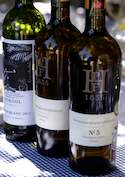During this decade a highly debated topic among members was the recognition of exceptional winemaking talent in the industry weighed up against the Guild becoming unwieldy by accommodating too many. The increasingly complex role of the Guild as study group, industry leader, business and brand also occupied its members, who take all these issues extremely seriously.
An Ever-Changing Milieu

In 2003 the Guild's second strategy planning session was held at Jordan Wine Estate, home farm of Gary Jordan, Guild member and management committee office-bearer for five years. The vision of the Guild as 'leaders in the art of winemaking' was formulated. Among auction guidelines fine-tuned was that all members be involved in the selection of auction wines in a blind [label unseen] tasting with a two-thirds 'yes' vote applied. The ruling was made that a winemaker should produce a wine for auction at least every three years.
It was also agreed that the Guild would benefit from expert input on the business side. Johann Krige had resigned as auction manager in 2000, accepting honorary membership in 2002. Thus, in 2004, the role of advisor on strategic business and organisational issues was accepted at the Guild's invitation by Gary May, a leading liquor industry consultant previously with South African Breweries and Guinness United Distillers and Vintners.
Further finessing came in 2008 at the Guild's third strategy planning session held at Beyerskloof, the home farm of longstanding Guild member Beyers Truter. The importance of the monthly technical tastings was underlined. Technical tastings - members have always viewed these as the Guild's raison d'être - once required just one bottle per tasting. As membership had grown, first two, now three bottles was needed. Expenditure had grown too, with wines costing up to R4 000 a bottle having to be sourced to maintain and improve the object of the exercise. A substantial budget increase to a few hundred thousand rands (currently R350 000) per year was therefore implemented, with some held in reserve.
'Time spent by a member on Guild business is overtime; it takes commitment and dedication.'
The tastings were hosted as a formal, sit-down event for up to 50 people (members, honorary members, protégés and invited guests) at the cellar of the presenter (or fellow member). The winemaker chose a theme, researched it and presented both information and about eight benchmark wines as illustration, for tasting 'blind' or 'sighted'. A guest speaker or guest presenter was sometimes invited by the members, many of whom having developed relationships and friendships with some of the world's leading growers, winemakers, coopers, educators and researchers.
At least 70 per cent of the wines needed to be non-South African examples of acknowledged quality. The Guild committee ‘cellarmaster’ provided a budget to cover the cost of the wines and a meal after the tasting. Given most of the members' appreciation of good food and of the integral role food plays in the enjoyment of fine wine, it's officially noted: 'Although the quality of the food is important, the focus should always be the quality of the wines.'
Eight technical tastings were held each year, interspersed with four 'technical workshops'. The latter provided a forum for an annual harvest review, research updates and discussions of pertinent issues affecting the wine industry.